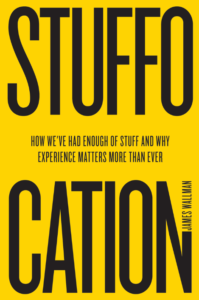A drag called Moan–opoly !
The idea here is not to bemoan, but a nudge to make things better. Because, we are all in it together. Remember, one of my earlier blogs- collective flourishing?
Distilled, actionable insights on branding, innovation, creativity, leadership, soul enhancement, marketing, advertising and design thinking
A drag called Moan–opoly !
The idea here is not to bemoan, but a nudge to make things better. Because, we are all in it together. Remember, one of my earlier blogs- collective flourishing?
It was sometime in the late 90’s. A cold, blistery Manhattan evening. And the Friday bar hopping had done its shift ( of mind, body & soul). Good bhais( after a few drinks ” all the world are brothers “- Fakespeare) and goodbyes exchanged multiple times over with friends, I headed to the nearest subway station to board the A train to Central Park West. From out of the shadows springs this unkempt man in an ill fitting New York Yankees hoodie and Harley Davidson tracks which had me stopping in my tracks, as if playing the childhood game called ‘ statue ‘. But, this was no time to take any liberties. As I stood there( no clue whether it was rooted by fear or was I sporting a false sense of spirited bravado thanks largely to the ‘spirit‘), the man broke into Lionel Ritchie’s ‘ Hello ‘.
Normal hellos are different, I am sure of that in spite of my state of inebriation. To tell you that his voice was exquisite would be an understatement. As he sang, he put his hand out begging for a few cents or dollars. He could have easily been on any Broadway stage and deserved all the spotlight. Not just New York, but cities around the world are home to the homeless, some of whom are incredibly talented. Here was this guy at the hands of a rampant, unjust and gentrifying urban market, doing what he thought he must in order to survive. He was using the talents he had to scrape by, so he could perform the following day, and every other day, over and over again.
We are all cogs in a system that tells us that we must be ‘ creative ‘ to progress. In hindsight, it appears that capitalism of the twenty-first century, turbocharged by neoliberalism, has redefined creativity to feed its own growth. To be creative in today’s society has only one meaning: to continue producing the status quo.
That said, it has always not been this way. Creativity has been and still is, a force for change in the world. It is a collective energy that has the potential to tackle capitalism’s injustices rather than augment them. Creativity can be used to produce more social justice in the world but for that it must be rescued from its current incarceration as purely an engine for economic growth.
Heralded as the driving force of society, creativity, allegedly, is the wellspring of the knowledge economy, shaping the cities we inhabit and even defining our politics and business. Then what could possibly be wrong with that?
My counterintuitive rant here is that we need to rethink the story that we are being sold.Creativity is a barely hidden form of the ever-expanding marketplace. It is a regime that prioritizes individual success over collective flourishing. It refuses to acknowledge anything-job, place, person- that is not profitable. And that changes everything: the places where we work, the way we are managed, and how we spend our free time.
Making a Cape sorry..Case of Good Hope!
We all know 2020 has been quite the decade (and we all have the stress wrinkles to prove it), so here’s hoping that this blog on hope is a boost.
Wisdom of the crowds.
Collective bias.
Herd mentality.
Birds of the same feather flocking together.
All of the above exemplifies the force and velocity of a human collective.
Why not add hope to the mix? The power of collective hope.
Unabashed capitalism has never been a great ally of either faith or hope. But our hopes, not our hurts, shape our future.
If we can combine accepting finite disappointment without losing infinite hope, we would all be in clover.
Writer and essayist Lu Xun has this to share on the power of collective hope:
” Hope is like a road in the country side..where there was never a road, but when many people walk on it, the road comes into existence “.
It’s not too late. The space of possibilities is endless. The most interesting terrain remains unexplored. Hope is like the sun. Never fails to rise.
Hope is a powerful four letter word. And collective hope is a fource to reckon with.
ENDS
1. A social condition that affects a society because of the elevated number of individuals striving to be wealthy. People within the society feel that the only measure of success is determined by how much money and prestige a person has.
2. A social theory claiming that individuals with very privileged and wealthy backgrounds sometimes struggle to determine the difference between right and wrong due to the nature of their upbringing. Also known as sudden-wealth syndrome.
Having done that, Stuffocation is defined by Macmillan’s Crowdsourced Open Dictionary as:
– a feeling of being oppressed by the amount of stuff you own. The problem in question is an anxiety christened stuffocation – a feeling of being oppressed by one’s ungovernable heap of belongings, acquisitions.
